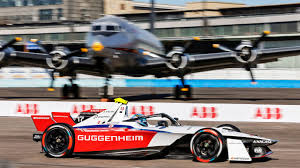The Rise and Relevance of Formula E Racing

Introduction
Formula E represents the cutting edge of motorsport, combining thrilling racing with a commitment to sustainability. As the world’s first fully electric racing series, it has gained significant popularity since its inception in 2014, attracting manufacturers, sponsors, and fans eager to embrace a cleaner future for motorsport. The importance of Formula E lies not only in its exciting races but also in its role as a platform for advancing electric vehicle technology and promoting environmental awareness.
Recent Developments in Formula E
As of October 2023, Formula E has been making headlines with the announcement of its upcoming race schedule. The series will enter Season 10, featuring several new teams and modifications to existing racing formats. Teams like Porsche, Jaguar, and Mercedes-Benz EQ are ramping up their efforts to secure the championship and showcase their advancements in electric car technology.
The following season will see races held in iconic cities around the world, including London, New York, and Berlin. A notable change for the upcoming season is the introduction of the Gen3 car, which promises to be significantly faster and more efficient than its predecessor. The Gen3 vehicle will compete at speeds of up to 200 mph and incorporate a more sustainable design through the use of eco-friendly materials.
Significance and Future of Formula E
Formula E has attracted attention not only for its high-octane events but also for its contributions to the promotion of electric vehicles (EVs). As governments and industries pivot towards electric mobility, Formula E serves as an effective platform for manufacturers to test and promote their electric technologies under extreme conditions. The connection between racing and consumer vehicles is becoming increasingly evident, as innovations from the track often find their way into the road cars of the future.
Moreover, the series standouts with its commitment to sustainability by offsetting carbon emissions and supporting social initiatives in the host cities, further enhancing its relevance as a sport in today’s ecological climate. The sport’s growing viewership, particularly among younger audiences, signals a successful push for wider acceptance of electric vehicles.
Conclusion
Formula E has undoubtedly positioned itself as a groundbreaking force in the motorsport industry, blending excitement with a crucial environmental message. As the series evolves with its new technologies and racing formats, it is poised to play a significant role in shaping the future of sustainable mobility. As we look ahead, we can expect Formula E to continue influencing public perception about electric vehicles and inspire the next generation of motorsport enthusiasts.









